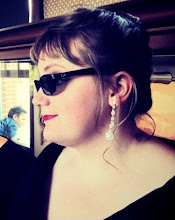I'm addicted to Wired articles, and this one made me squeal aloud with delight: Print: Applying Quantitative Analysis to Classic Lit.
Using Google-esque search technology in the analysis of literary mechanics? I am all atwitter! (I may have to tweet about this.) My English major heart has finally been wedded with my Google love affair.
Now if only my English professors would get over their stereotypical technophobia, we could have some real fun with this. Most of the linguistics professors here seem well-integrated with technology (due to a closer relationship with language mechanics rather than the more nebulous analysis?), but most lit professors seem to have a real avoidance of technology. Features like this, though, hold some real promise for bringing the study of literature into the Era of Google.
Doesn't the idea of literary word clouds sound fascinating? I love word clouds in general, but now I'm terribly curious about what word-frequency indicates in a piece of literature.
Here's an experiment:

This is a word cloud of the text of Alice's Adventures in Wonderland (though not Through the Looking-Glass, maybe I'll do that next). Isn't it lovely? It looks dreamy, like a thought-bubble emerging from Alice. Aesthetics aside, this cloud tells us a lot, thematically speaking. To have words like "know", "thought", "went", and "time" appear so large is a strong indication of the existential qualities of the novel. I would have thought "Rabbit" to be bigger, though. And "curious" as well. Hm.
If there were a word cloud of the complete works of Oscar Wilde, how big do you think "fascinating", "shame", and "vermilion" would appear? I know for a fact that Wilde rhymes with "vermilion" at least three times in his volumes of poetry. I'm not sure what that says thematically, but I know it indicates that he's a great big show-off. What a marvelous paper that would be. "The Statistics of Showing Off: Frequency of Word Usage in the Works of Oscar Wilde". I sense a thesis coming on.


You should present Alice and Looking Glass papers based on word clouds at LCSNA
ReplyDeleteOh wow! That's a great idea! I may have to think about that...
ReplyDelete